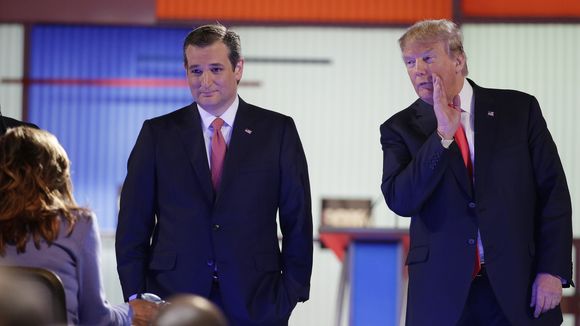Before New York, Ted Cruz was on a winning streak (one way or another). But he’s headed into unfriendly territory. He’s not likely to catch up to Trump, was just eliminated mathematically from getting 1,237 ahead of the convention, and Republicans say the candidate with the most votes should win the nomination. Meanwhile, Rubio and Kasich continue to have an impact on the race.
Real Clear Politics has analyzed the recent “Cruzmentum.”
For the last few weeks, Ted Cruz has been on a roll. He racked up delegates in Colorado, Utah and Wisconsin, gained significantly in national polls and (if you believe the betting markets) increased his chances at winning the Republican nomination by about 20 percent. This is a big shift from a little over a month ago, when Donald Trump looked inevitable to some and was on track to get a majority of the delegates by the end of the primaries.
So what changed? Why did Cruz suddenly start making these gains instead of John Kasich or Trump? There are typically a number of interconnected explanations for any significant political trend, but Cruz’s recent success seems to stem from picking up Marco Rubio’s voters and cashing in on early investments in on-the-ground organization.
At the end of his campaign, it’s clear that “Little Marco” hated Trump. And so did his supporters. So it’s no surprise that Cruz picked up this “Anti-Trump” vote. Largely, this is because Trump has made a pitch for middle class voters, while “Rubio’s base consisted primarily of higher-income, better-educated, ideologically conservative suburbanites.”
But another reason for “Cruzmentum” was his Washington-insider knowledge of how to do politics, “cashing in on his early investments in a solid campaign infrastructures. Specifically, his campaign has been working the delegate selection process.” It’s about knowing how to use the status quo. “Cruz has, in multiple states, worked the delegate process so that his supporters fill those slots and get on key committees. In fact, that’s precisely how he netted 34 delegates from Colorado.”
However, “Cruz’s Hot Streak Might End.”
Unfortunately for Cruz, the calendar might have put an end to his momentum. Specifically, a slew of unfavorable states are around the corner, and decisive losses could cause Cruz to lose Rubio voters to Kasich and face more resistance in the delegate selection process.
In primaries, there’s a well-known bandwagon effect — voters like to cast their ballots for candidates who are doing well — and in the last few weeks that has benefited Cruz. But if Cruz fares poorly in upcoming Northeastern and mid-Atlantic states. . .he could lose some of those newly gained Rubio voters to Kasich. . .[whose] income and education levels make them closer demographically to Kasich voters.
Also, if Cruz’ “bandwagon effect” hits a roadblock, even anti-Trump people may desert him. “These potential delegates will feel a great deal of pressure not to subvert what they see as the democratic will of the voters.”
Success breeds success. And as noted, while most of the “anti-Trump” vote is going to Cruz now, Kasich has his own constituency, which is more positive-minded. And that’s why, after campaigning for Kasich in Ohio, Mitt Romney now wants him out, according to the Washington Examiner.
Former Republican presidential nominee Mitt Romney predicted Monday that Donald Trump will become the GOP nominee if both of his opponents remain in the race until the convention this July.
“I think that Mr. Cruz and Mr. Kasich divide the vote, and that makes it easier for Mr. Trump to win the winner-take-all congressional districts and the winner-take-all states and get the delegates he needs to either hit the 1,237 or get close enough to sway the uncommitted delegates on the first ballot,” Romney said during a podcast with CNN’s David Gregory, which is set to be released in full on Friday.
Of course, that’s one man’s opinion. The Trump camp would also like to see Kasich leave the campaign, because as noted, they are not “anti-Trump.” They think alike in many ways, so Kasich would likely draw off voters who might otherwise give Trump the big wins he needs to get to 1,237.
Also, Kasich is becoming more sophisticated. Indiana is a case in point. The IndyStar points out that Kasich learned from Cruz how to “stack the deck.”
Ohio Gov. John Kasich claimed victory Monday in a behind-the-scenes battle for Indiana’s delegates, prompting Republican presidential front-runner Donald Trump to cry foul.
Kasich’s campaign said it has secured the support of a majority of Indiana’s 57 delegates to the Republican National Convention, where their personal preference might ultimately decide the party’s presidential nominee.
“We feel very good about the number of delegates who will support Governor Kasich on a second ballot,” said Pete Seat, a consultant to Kasich’s Indiana campaign. “Electability is an extremely important part of the nomination for the Indiana delegation. The whole point of this is to win the White House. Governor Kasich has the best shot of doing that.”
That suggests that Romney is wrong (again), and while Kasich is a long-shot for the nomination, his staying in the race hurts Trump more than Cruz. And if Trump doesn’t win before the convention, many or most of “his” delegates will dump him—despite the vote of the people.
